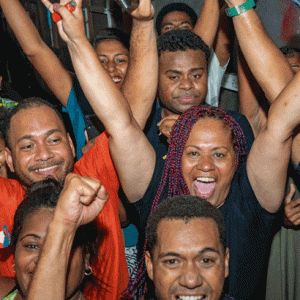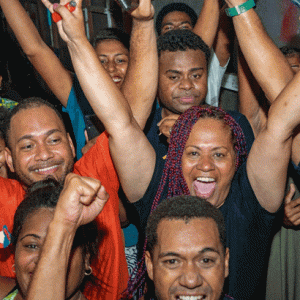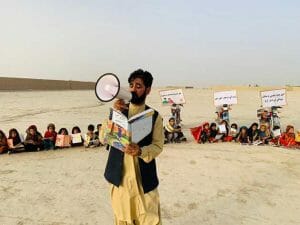

Credit: Pita Simpson/Getty Images
By Andrew Firmin
LONDON, Apr 28 2023 (IPS)
It’s been a time of significant change in Fiji following the country’s December 2022 election. A close vote was followed by the formation of a new coalition government. Frank Bainimarama was out as prime minister after 16 years, replaced by Sitiveni Rabuka.
Rabuka was hardly a new face, having been prime minister in the 1990s, and both Bainimarama and Rabuka had previously led military coups. For Fiji’s civil society, the question was whether this political shift would bring improvements in civic and democratic freedoms. Bainimarama’s government had shown itself increasingly intolerant of dissent.
People who criticised the government were subjected to harassment and arrest. In July 2021, nine opposition politicians were arrested, questioned and accused of inciting unrest. In 2020, opposition party offices were raided by police in response to social media posts critical of the government.
The outgoing government used the Public Order Act to restrict protests, including by opposition parties. The Fiji Trade Union Congress was repeatedly denied permission to march and its leader charged with public order offences. Police often used excessive force against protests, with impunity. There was, in short, much room for improvement.
Positive steps on media freedom
The most encouraging move so far is the repeal of the Media Industry Development Act. This law, passed under the Bainimarama government, established a highly interventionist government-controlled media regulator. Journalists could be jailed for two years and media outlets slapped with heavy fines if their reporting was judged to go against the national or public interest – vague terms open to broad interpretation. This encouraged self-censorship.
The law was one of the main reasons Fiji was the lowest-ranking Pacific Island nation on Reporters Without Borders’ World Press Freedom Index. Media freedom constraints came from the top, with the government favouring state-aligned media, including by withholding advertising from more critical outlets.
Now the media and civil society will be looking for the government to go further. A sedition law that can bring extensive jail sentences remains in need of reform. And beyond this, the government needs to actively support the development of independent Fijian media, including through the fairer distribution of ad spending.
The new government has also moved to rebuild relationships with trade unions. In February it confirmed it would re-establish an effective tripartite forum that brings together government, trade unions and employers; its predecessor was accused of not taking this seriously. The new government has said it will bring to an end the harassment, intimidation and arrest of union leaders. Unions will work to hold the government to these promises.
A fall from grace
These changes have come against a backdrop of continuing political polarisation. It’s been quite the journey for Bainimarama since losing power. In February he was suspended from parliament. This came after he used his first speech as leader of the opposition to deliver a stinging critique of Fiji’s president, Ratu Wiliame Katonivere.
In his speech, Bainimarama appealed to the military to ‘not forsake their constitutional role’. This seemed a coded plea for military intervention: the 2013 constitution, introduced by Bainimarama, gives the military the power to intervene to ensure the ‘safety and security of the country’. When he was still prime minister, as post-electoral negotiations were taking place, Bainimarama had ordered the military onto the streets.
Bainimarama’s response to his suspension was to resign from parliament. But he made clear his intent to stay politically active and remains party leader.
Last month Bainimarama was charged with abuse of office while prime minister. He was granted bail after pleading not guilty. He’s alleged to have intervened to stop a police investigation into alleged corruption at the University of the South Pacific. Police Commissioner Sitiveni Tukaituraga Qiliho, currently suspended, is also charged with abuse of office for the same case and has also pleaded not guilty.
Dangers ahead
The obvious danger is that Bainimarama, no longer confined by parliamentary niceties, could seek to stir unrest through sensationalism and disinformation, which could offer a pretext for his supporters in the military to intervene. The spectre of military rule is never far away in Fiji. There have been four coups since independence in 1970. Rabuka led two in 1987 and then Bainimarama headed coups in 2000 and 2006. In this context, it’s ominous that in January the head of the army expressed concern about ‘sweeping changes’ being introduced by the new government.
On all occasions the pretext for coups has been ethnic unrest, with Fiji’s population broadly divided between Indigenous Fijians and people of Asian heritage. Civil society and the international community will need to stay alert to any attempts to foster division and mobilise one population group against the other.
At the same time the new government needs to beware of fuelling narratives that it’s being vindictive towards Bainimarama and his party. There’s a need to ensure that diverse points of view can be aired – including from the new opposition. As a former coup leader, Rabuka needs to keep proving his commitment to democracy.
What happens next in Fiji is of concern not just for Fijians but for the region, since the country is a major hub and host of key regional institutions. China and the USA, along with Australia, are trying to build closer relations with Fiji as they compete for influence among Pacific Island nations. So whether Fiji becomes more democratic and opens up civic space matters.
In these early days of the new government there can be no room for complacency. Fiji’s civil society must be supported and enabled as a vital democratic force. And it must keep on engaging constructively to ensure that government promises are followed by deeds that advance rights.
Andrew Firmin is CIVICUS Editor-in-Chief, co-director and writer for CIVICUS Lens and co-author of the State of Civil Society Report.




